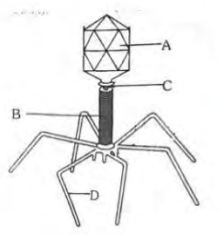1. The genetic material of HIV is
A) DNA
B) RNA
C) Both DNA & RNA
D) Either DNA or RNA
B) RNA
2. Which of the following is a rod shape virus
A) HIV
B) TMV
C) Bacteriophage
D) Bacillus
B) TMV
3. Which of the following is a pleomorphic bacteria
A) Rhizobium
B) Acetobacter
C) Clostridium
D) All of these
B) Acetobacter
4. Which of the following organelle is present in bacteria?
A) Mitochondria
B) Chloroplast
C) Ribosome
D) Lysosome
C) Ribosome
5. Pencillin was discovered in ____
A) Virus
B) Bacteria
C) Plant
D) fungi
D) fungi
6. The target cell of HIV is _________
A) R.B.C
B) W.B.C
C) Platelets
D) All of the above
B) W.B.C
7. Which of the following is a waterborne disease caused by virus?
A) Hepatitis A
B) Hepatitis B
C) AIDS
D) All of the above
A) Hepatitis A
8. Which of the following cannot begrown on artificial medium?
A) Virus
B) Bacteria
C) Fungi
D) All of the above
A) Virus
9. The target cell of polio virus is _____?
A) Motor nerve cell
B) Liver cell
C) Erythrocyte
D) Lymphocyte
A) Motor nerve cell
10. The number of morphological types of bacteria and cells respectively found in a test tube which contains 20 Monococci, 10 Monobacilli, 10 Diplococci, 30 Tetracocci and 10 Sarcina are
A) 5 and 300
B) 2 and 250
C) 2 and 320
D) 4 and 330
B) 2 and 250
11. Staphylococcus bacterium is a
A) Chain-like colony
B) Plate-like colony
C) Bunch-like colony
D) Cube-like colony
C) Bunch-like colony
12. Which of the following is not correct?
A) Coccus-Spherical
B) Bacillus-Rod-shaped
C) Vibrio-T-shaped
D) Spirillum-Spiral
C) Vibrio-T-shaped
13. Bacteria bearing only one flagellum at the body is called
A) Monotrichous
B) Peritrichous
C) Cephalotrichous
D) Atrichous
A) Monotrichous
14. Fimbriae and pili are short filamentous structures composed of protein
A) Flagellin
B) Tubulin
C) Pilin
D) Actin
C) Pilin
15. The cell wall of bacteria consists of
A) N-acetyl glucosamine
B) N-acetyl muramic acid
C) Both (A) and (B)
D) Cellulose
C) Both (A) and (B)
16. Food poisoning is caused by the infection of
A) Bacillus megaterium
B) Salmonella typhi
C) E.coil
D) Clostridium botulinum
D) Clostridium botulinum
17. 'Crown gall' disease is caused by
A) Mycobacterium
B) Agrobacterium tumefaceiens
C) Erwinia
D) Clostrdium
B) Agrobacterium tumefaceiens
18. Waksman got the Nobel Prize for the discovery of
A) Pencillin
B) Chloromycetin
C) Streptomycin
D) Neomycin
C) Streptomycin
19. The germ theory of disease was proposed by
A) Koch
B) Pasteur
C) Both(A) and (B)
D) Devaane
C) Both(A) and (B)
20. Bacterial cell contains
I. 70S ribosomes II. 80S ribosomes
III. Plasmids IV. Mitochondria
Codes:
A) I, II and III
B) II and IV
C) I and IV
D) I and III
C) I and IV
21. Organisms called methanogens are most abundant in a
A) Cattle yard
B) Polluted stream
C) Hot spring
D) Sulphur rock
A) Cattle yard
22. Select the wrong statement
A.W.M. Stanley showed that viruses could be crystallized
B. The term 'contagium vivum fluidum' was coined by M.W. Beijerinek
C.Mosaic disease in tobacco and AIDS in human being are caused by viruses
D. The viroids were discovered by D.J. Ivanowsky
D. The viroids were discovered by D.J. Ivanowsky
23. Select the total number of diseases from the following caused by bacteria:
Mumps, Smallpox, Citrus canker, Cholera, Typhoid, Tetanus, Sleeping sickness, Malaria
A) 2
B) 4
C) 5
D) 6
B) 4
24. Given below is the diagram of a bacteriophage. In which one of the options all four parts A, B, C and D are correct?

A) A: Tail fibres, B: head, C: Sheath, D: Collar
B) A: Sheath. B: Collar, C: Head, D: Tail fibres
C) A: Head, B: collar, C:Sheath, D: Tail fibres
D) A: Collar, B: Tail fibres, C: Head, D: Sheath
C) A: Head, B: collar, C:Sheath, D: Tail fibres
25. Chlorobium is an example to
A) Photo autograph
B) Chemo autograph
C) Photo heterotroph
D) Chemo heterotroph
A) Photo autograph